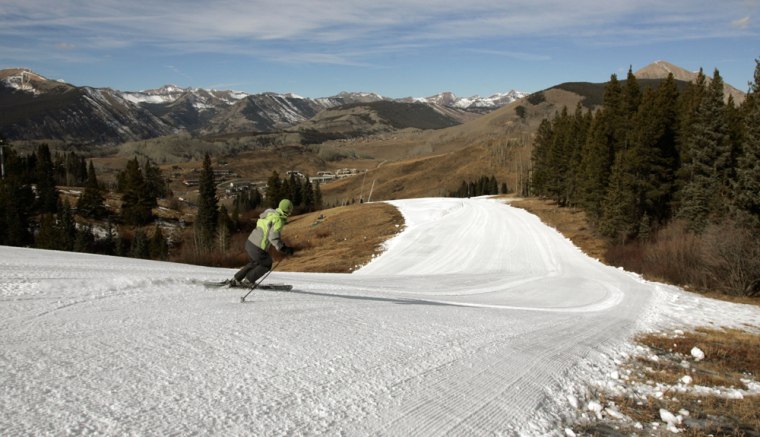Colorado's $2 billion winter sports industry and millions of acres of forests are threatened by warming temperatures in the state, business and conservation leaders say.
Bark beetles have been able to infest about 3 million acres of pine trees in Colorado without long bouts of subzero weather to kill them, said Joe Duda of the Colorado State Forest Service.
Moreover, shorter winters and warm weather that brings rain rather than snow spell big trouble for Colorado's ski areas, said Auden Schendler of the Aspen Skiing Co.
Aspen Skiing has taken steps to become more energy efficient and help cut fossil fuel emissions, which produce greenhouse gases and heat the atmosphere, Schendler said.
"What matters most is getting people in Washington to know that we care about this," Schendler said.
The ski company's chief executive has talked to White House officials and members of Congress.
David Dittloff, a regional coordinator with the National Wildlife Federation, said the environmental group has flown hunters and anglers to Washington and worked with American Indian tribes and businesses to promote legislation to reduce greenhouse gases.
"The health of wildlife populations and many species depend on us," Dittloff said.
The economic benefits of Colorado's wildlife total about $3 billion annually, including hunting, fishing and wildlife watching, Dittloff said.
Schendler said erratic weather — shorter winters, rain in the spring instead of snow — has been a wake-up call for the ski industry. Colorado's ski areas don't start making money until March, said Schendler.
"If you lose March in the ski industry," Schendler said, "you go out of business."
The warmer weather also makes it tougher to make snow, he said.
Coal controversy
A big part of the solution is to replace coal-fired power plants with cleaner-burning fuels, Schendler said. He criticized Rep. John Salazar, D-Colo., for joining a congressional caucus on coal.
Salazar represents western Colorado, which includes Aspen and other ski resorts.
"We think he shouldn't try to fundraise in Telluride or Aspen," Schendler said of Salazar.
The congressman joined the new caucus for representatives from coal-producing states because his district includes 3,000 workers in the industry, said Eric Wortman, Salazar's spokesman.
Salazar wants to explore technology aimed at making coal production cleaner, including capturing carbon dioxide emissions, Wortman said.
Salazar voted against a bill targeting climate change that passed the House but hasn't been considered in the Senate. Salazar thought the bill was too expensive, Wortman said.
"The congressman believes global warming is an issue," he said.
